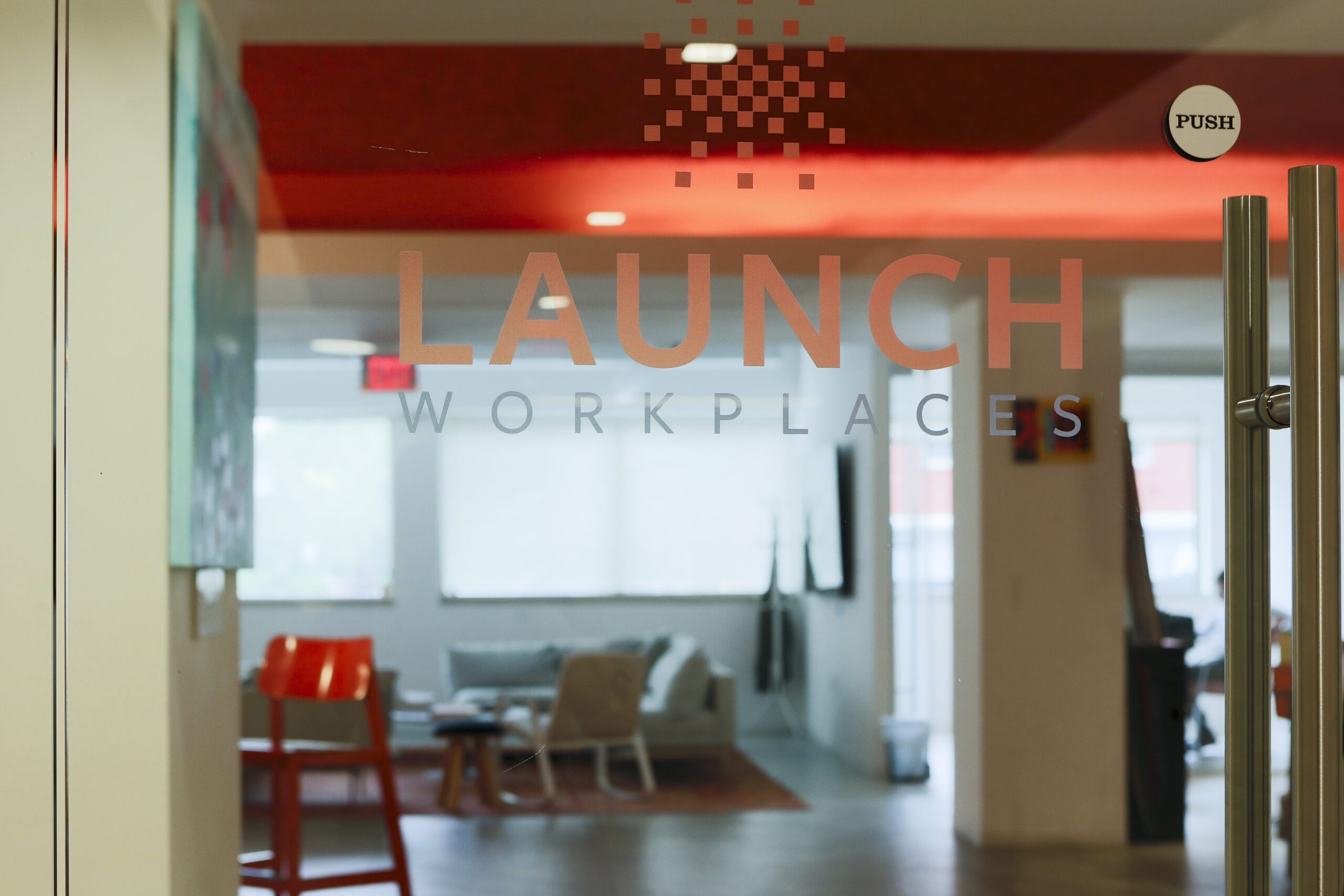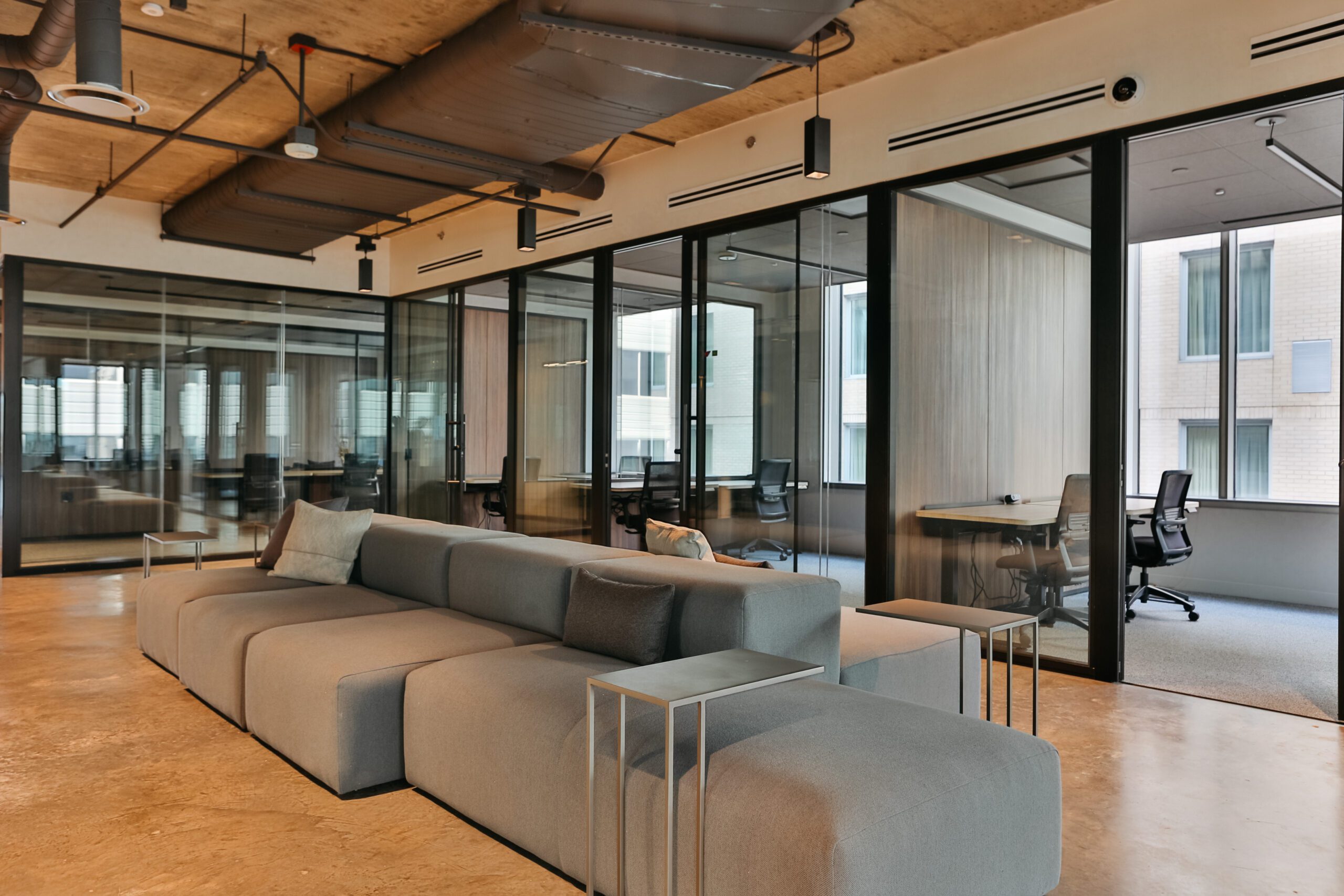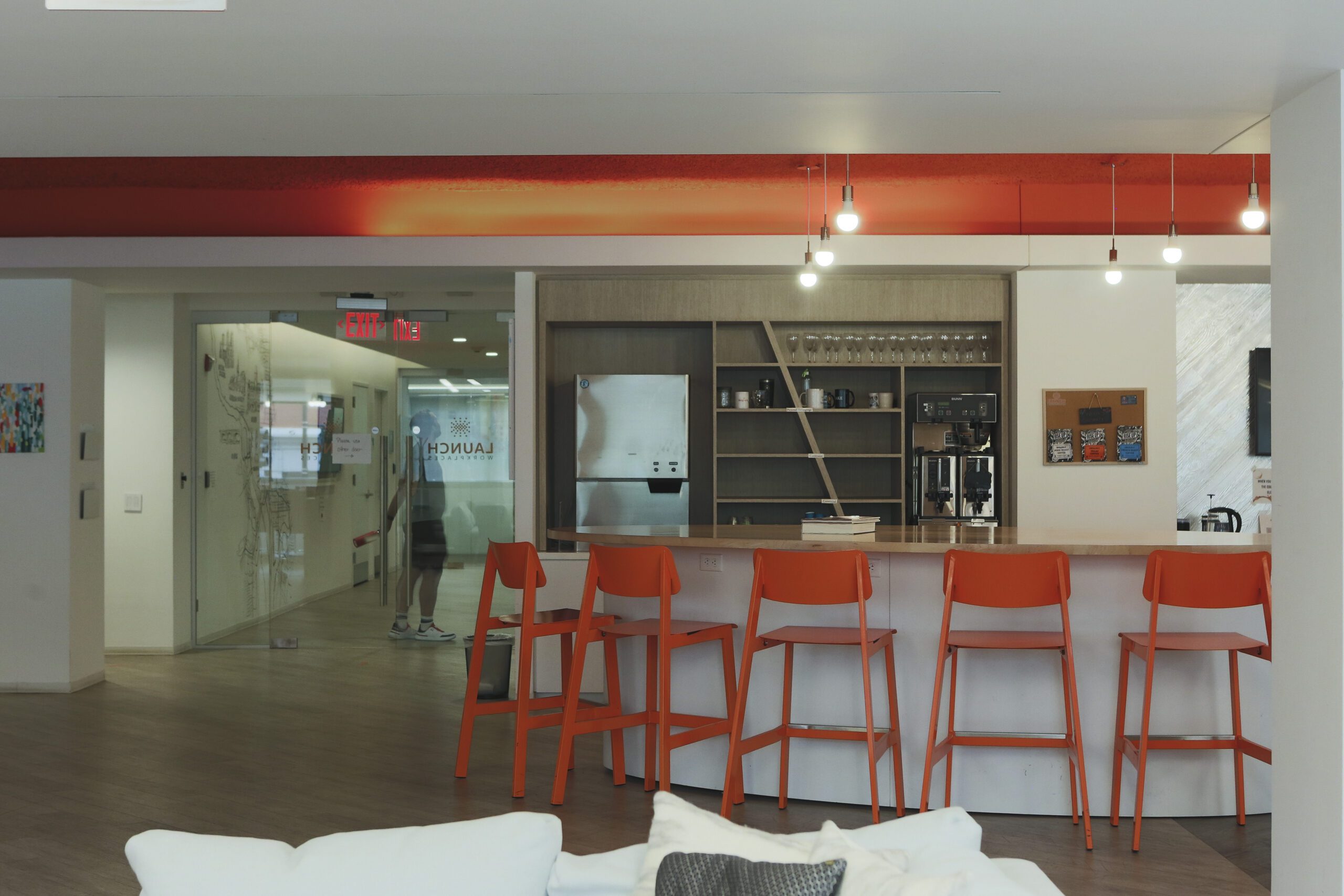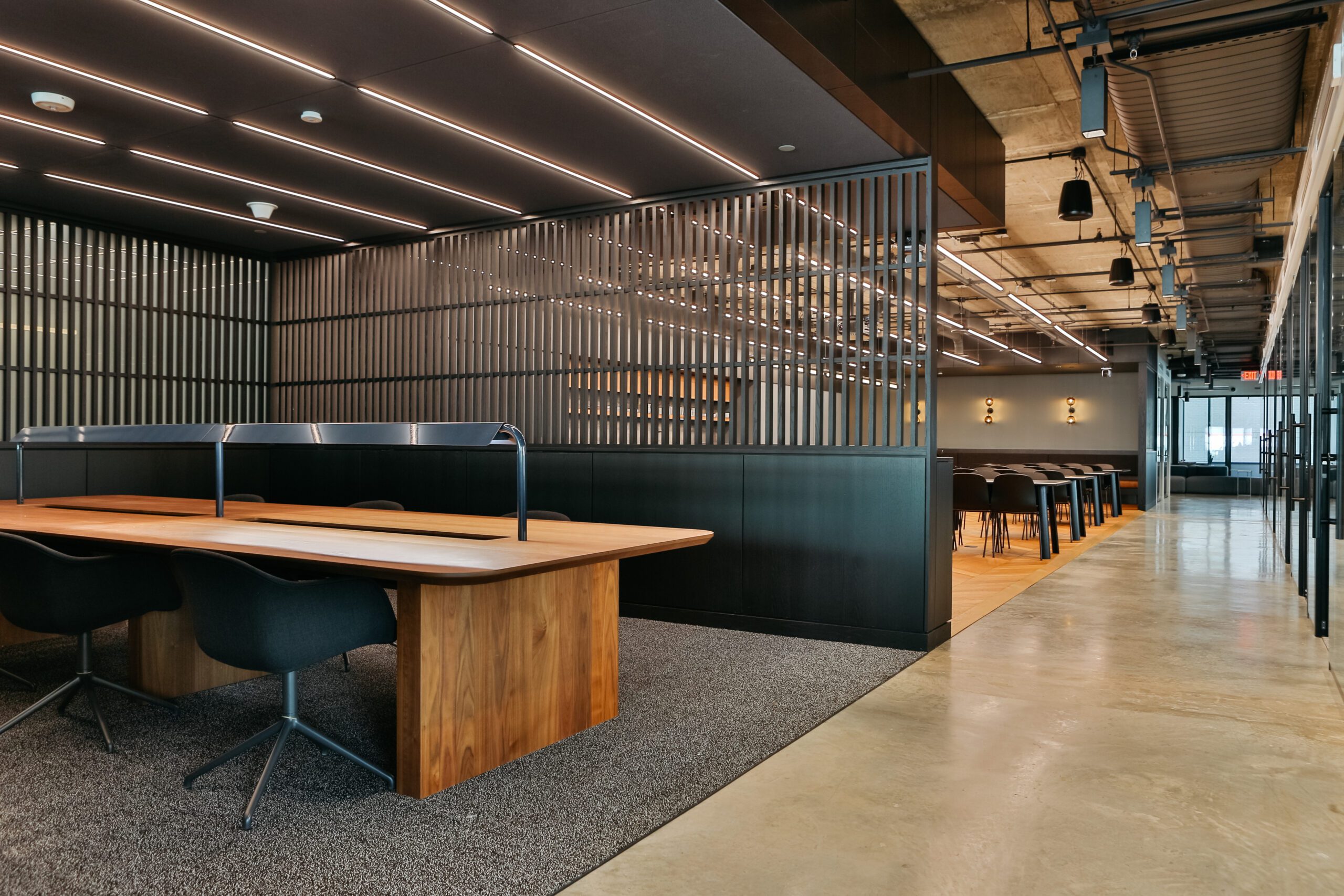
Are you researching office space options for your business and feeling confused by the concepts of a serviced office vs coworking space? If so, you’re not alone—they’re similar in many ways but with a few nuanced differences.
Serviced offices are generally bigger suites with private amenities designed for larger teams, while coworking spaces typically offer smaller private offices alongside a variety of other membership options. However, both models are hospitality-inspired, meaning high-touch service is a foundational element.
In this article, we’ll explore the key similarities and differences between a serviced office vs coworking space to help you determine which is best for your business.
The High-Level Details: Serviced Office vs Coworking Space

Here’s the first thing you need to know: serviced office spaces and coworking spaces both fall under the category of flexible office space.
But to make this make more sense, let’s pull back to a 30,000-foot view.
When you’re looking for an office space, you typically have two main options:
- Traditional office space
- Flexible office space
In a traditional office space, you sign on for a long-term lease—typically three to five years. You’re responsible for:
- Renovating it and updating it
- Furnishing it
- Setting up your tools, hardware, and IT infrastructure
- Running and managing the office (and, ideally, hiring someone to handle this for you)
- Cleaning and maintaining it
- Handling any fixes or issues
You’re essentially on your own—you probably will only hear from your landlord when they come to collect the rent check or try to extend your lease.
And, if you need to get out of your lease for any reason, it will be costly and challenging—if it’s possible at all.
On the other hand, flexible office spaces take a different approach.
In a flexible office space, you can rent space with more flexible terms—sometimes even month-to-month for some memberships.
This means you’re not locked into a lease for multiple years, regardless of whether your business or team grows or contracts. This helps your business maintain its operational agility.
But the biggest difference between flexible office space and traditional office space is service.
With a flexible office space, you’re getting full service. This means you have a team on-site who handles everything for you, including:
- Welcoming and greeting guests
- Managing the office
- Providing support when it’s needed
- Troubleshooting issues and handling maintenance
Beyond that, flexible office spaces are typically:
- Turnkey and furnished for you
- Set up with all of your IT, internet, and cybersecurity
- Equipped with professional tools like printers and scanners
These workspaces save you time, money, and headaches since you don’t have to worry about doing things from scratch or learning how to do things that aren’t your core competencies.
Essentially, flexible offices are hospitality-inspired—like the hotels of office space.
Here’s where you really need to pay attention: under the “flexible office space umbrella,” you’ll typically find Coworking Spaces and Serviced Offices.
What is a Coworking Space?
Coworking spaces generally have a more extensive mix of membership tiers, such as:
In these environments, there’s a significant allotment of open-plan office space mixed with private workspaces for small- to medium-sized teams.
Coworking spaces typically have shared amenities such as:
- Kitchens
- Meeting and conference rooms
- Lounge areas
- Phone booths
It’s important to understand that these are shared, which means they’re not part of any one workspace, but this also means the costs are shared among all of the members in that coworking space.
What is a Serviced Office Space?
The term “serviced office” typically refers to a scenario where there are, for example, a few large office suites on one floor of a building.
These suits are typically larger—in the thousands of square feet—and are ideal for teams of between 20 and 100 (or more) employees.
In a serviced office, the service and support elements are still foundational, meaning you’ve got an on-site team that handles office management.
And, like coworking spaces, serviced offices often come furnished, are typically set up with essential IT infrastructure, and offer significantly more flexibility when it comes to your rental terms.
In fact, many coworking operators, like Launch Workplaces, provide both coworking space and serviced offices to help businesses scale in place while still enjoying the amenities they’ve come to expect.
Serviced Office vs Coworking Space: Diving Into the Finer Details

Serviced offices and coworking spaces are both considered flexible office spaces and have a lot of benefits to offer over traditional offices.
In this section, we’ll explore the similarities and differences between a serviced office vs coworking space and how they stack up against traditional offices.
Cost
Serviced offices are typically more expensive than coworking spaces. This is mainly because they are much larger spaces and include private amenities within the suite.
Coworking spaces are generally more cost-effective because the workspaces and amenities are communally shared with other companies and individuals.
Flexibility
Serviced office spaces and coworking spaces both offer top-tier flexibility.
With coworking spaces, whether you purchase a monthly membership or day pass, you can show up and access the facilities when you need. You can easily purchase more memberships or passes for additional team members.
Amenities and Facilities
With a serviced office space, your primary amenities—like conference rooms and kitchens, to name a few—are typically located inside your suite. This means you have virtually guaranteed access to them when you need them.
On the other hand, coworking spaces have shared amenities that every member of that space can access. So, you’ll need to book them in advance to guarantee you can use them.
Business Support Services
When it comes to a serviced office vs coworking space for business support services, both offer great options.
Depending on the location, flexible office space support services could include:
- Reception
- Intra-office communications
- Mail and package acceptance
- Printing services
- Fast internet
- Physical business mailing address
Privacy and Security
You don’t have to be concerned about security in a flexible office space. Both coworking spaces and serviced office spaces have critical IT and network infrastructure to protect your private data.
Serviced offices make it easier to guarantee privacy. There’s no risk of someone seeing confidential information on your screen or overhearing a private conversation because no one outside of your company is in your private office.
You can still have private conversations in coworking spaces, but you’ll need to move from your hot desk to a meeting room or conference space to do so.
Networking Opportunities
Coworking spaces have no shortage of networking opportunities since there are many communal areas where you can meet and interact with other professionals. Access to a professional community is a significant focal point. Coworking spaces often host events and mixers that allow their members to connect and get to know each other.
On the other hand, serviced office spaces are more private and have fewer communal spaces, so there are fewer opportunities to network and connect outside of your team or company.
Access Control and Visibility
Both serviced office spaces and coworking spaces tend to have great access control and security, either with a front desk checking people in, a swipeable card, or a key fob. However, because coworking spaces are shared and guests are allowed in, there may be more people coming and going from the space.
In terms of visibility, serviced office spaces and coworking spaces are located in a variety of places, from business parks to trendy downtown locations to suburban areas.
At Launch Workplaces, we have a multitude of locations in Maryland, Cleveland, and Washington, DC, from urban centers to suburban markets.
Serviced Office vs. Coworking Space FAQs

Q: What is a coworking space, and what type of businesses thrive in coworking spaces?
A: Are you finding yourself wondering, “What is a coworking space?” Let us demystify it. Coworking spaces are collaborative, flexible, membership-based communal workspaces. Coworking spaces were popularized by technology start-ups like Spotify and Uber and made it easy for them to scale their team up and down without worrying about long-term, expensive contracts.
Coworking spaces are ideal for businesses that:
- Prioritize distributed, remote work
- Need flexibility with their office size
- Encourage forward-thinking collaboration and networking
- Want to minimize the risk associated with mid to long-term office space contracts
- Want an enterprise coworking space that’s reliable and secure
Entrepreneurs, freelancers, and consultants are also a great fit for coworking spaces because they are affordable and accessible for a single person or small team. They are also a great way to network and meet other professionals.
People who don’t tend to have high in-office rates, like creative, insurance, financial services, legal services, arts and culture, and nonprofit professionals, may all like the appeal of having a coworking space to call home for work hours.
Q: Is a serviced office vs coworking space better for scalability?
A: A serviced office space offers more flexibility for scaling than a traditional office. However, coworking spaces take the cake, offering flexible, short-commitment terms that make it easy to adjust to rapid changes that can happen in a business.
Q: What impact do serviced offices and coworking spaces have on company culture?
A: Working in a shared environment like a coworking space fosters an environment and culture of collaboration and networking. Coworking spaces often have dedicated collaboration zones with whiteboards, comfortable couches and chairs, and long tables designed to get teams brainstorming and working together. The atmosphere of being around a diverse group of people can also help spark creativity and teamwork.
Q: How do the environments of serviced offices and coworking spaces impact productivity?
A: Flexible office solutions, like coworking spaces and serviced office spaces, offer a refreshing break from the home office and all the distractions that come with it.
Both coworking spaces and serviced office spaces are perfectly set up and designed to encourage productivity and focus. They also provide your remote team with the professional tools and amenities to do their best work, from snacks, coffee, and tea on standby to dedicated call and meeting rooms and high-speed internet.
Choosing between a serviced office vs coworking space comes down to what works best for your business. Do you want private space and amenities for a large team, or would you prefer a more dynamic work environment with a variety of membership options for your team?
We crafted this resource to help you answer that question by understanding your flexible office options and determining which one is best for you.Ready to explore your coworking and serviced office options? We’re here to help. Book a tour of your local Launch Workplaces location today.



